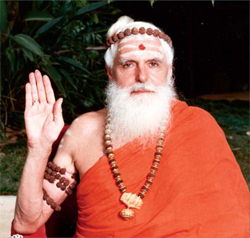BE HAPPY FOR THEM
Is someone you know dying?
If a person knows he is terminally ill, that knowledge is a blessing, for he can prepare. He should not hesitate to tell his relatives he is going to die, and that is a wonderful blessing for them, as they can prepare for his great departure. Now all know he has finally arrived at the end of his prarabdha karmas and is going to fly. In turn, family and friends should release him, be happy—he is going to be happy with no physical body—for they know they will be as close to him in his astral and soul body as they were in his physical body. They will visit him every night when they sleep, in the inner worlds, and learn many things from him as to how to prepare for their own great departure, be it sudden or prolonged. Don’t cry; you will make him unhappy. You should be happy for him, because he is going to be happy. It is not a sad occasion. For Hindus, death is a most exalted state, an incredible moment that you spend your whole life preparing for. Birth is the unhappy occasion. Death should be a big party. He has just gone through his day of Brahma.§
The sadness at death comes from Western attitudes. Western thought has to be reversed. Here a child comes into birth. It is sad, because he was all right before he was born. Now his prarabdha karmas are going to start to explode. He has to deal with his past, which he did not have to deal with in the Devaloka. He has a chance to make new karmas. The time of birth is the grave time. When he dies, that means that section of the jyotisha is finished and he can go and have a great rest and be with intelligent people. It is great inside there and difficult out here.§
When people tell me they or a loved one have cancer, AIDS or some other incurable disease, my counsel is this. Everyone dies, but it is a blessing to know when you are going to die, because then you can prepare for it, make a decision whether you are going to be reborn, do intense sadhanas, make preparations. Eastern men don’t fight terminal cancer or AIDS. They go to an astrologer or palmist, ascertain their time of death, then prepare themselves. It’s really a blessing. It’s best not to fight it or “cure it,” since you are interrupting your timing. Just let it happen. Heed the wisdom of the Vedas, “When a person comes to weakness, be it through old age or disease, he frees himself from these limbs just as a mango, a fig or a berry releases itself from its stalk.”
§

People wonder whether death is a painful process, such as in the case of cancer victims. Cancer, which produces a lot of pain, is a process of life which results in death, but death itself is not painful. Death itself is blissful. You don’t need any counseling. You intuitively know what’s going to happen. Death is like a meditation, a samadhi. That’s why it’s called maha (great) samadhi. A Hindu is prepared from childhood for that mahasamadhi. Remember, pain is not part of the process of death. That is the process of life, which results in death.§
People always lament when someone dies quickly, saying, “His life was cut short so suddenly.” But with such a death there is no pain, as the soul knows it’s coming. It’s really so much better than a slow, lingering death. The problem comes when doctors bring the dying back. Then a lot of pain is experienced. The doctors should let them die.§
To make heroic medical attempts that interfere with the process of the patient’s departure is a grave responsibility, similar to not letting a traveler board a plane flight he has a reservation for, to keep him stranded in the airport with a profusion of tears and useless conversation. Prolonging the life of the individual body must be done by the individual himself. He needs no helping hands. Medical assistance, yes, is needed to cauterize wounds, give an injection of penicillin and provide the numerous helpful things that are available. But to prolong life in the debilitated physical body past the point that the natural will of the person has sustained is to incarcerate, to jail, to place that person in prison. The prison is the hospital. Prison is the sanitarium. The guards are the life-support machines and the tranquilizing drugs. Cellmates are others who have been imprisoned by well-meaning professionals who make their living from prolonging the flickering life in the physical body. The misery of the friends, relatives, business associates and the soul itself accumulates and is shared by all connected to this bitter experience to be reexperienced in another time, perhaps another lifetime, by those who have taken on the grave responsibility of delaying a person’s natural time of departure.§
In summary, we can see that the experience of dying and death is as natural as birth and life. There is little mystery there to be understood.§
MORE TOOLS FOR COPING WITH DYING§
- Be open and prepared to talk and make amends, forgive old tensions and conflicts, tie up loose ends, thus helping the person feel complete and release this world joyfully.
- Spend time with the dying person, singing religious songs and reading from scripture. Be a loving witness to their passage.
- When someone dies, take an attitude of joy based on your knowledge of the law of karma and samsara.
